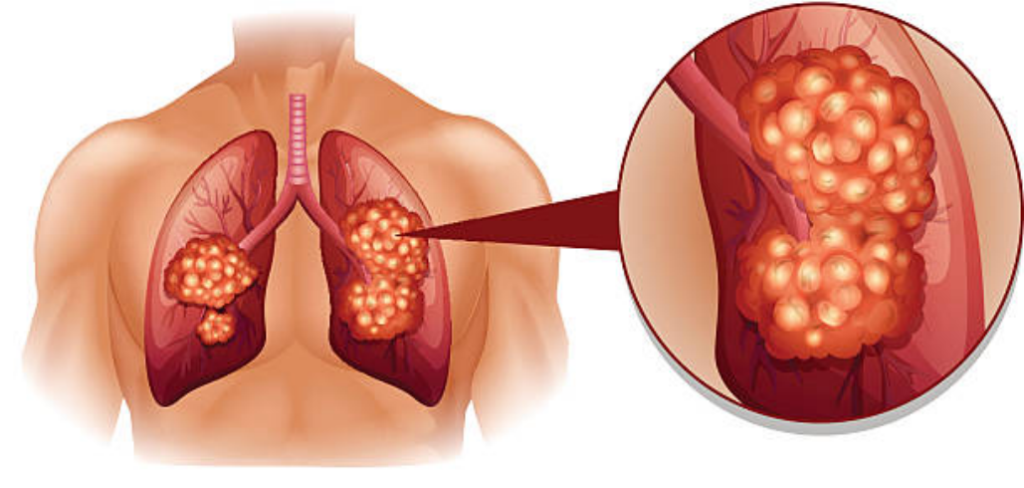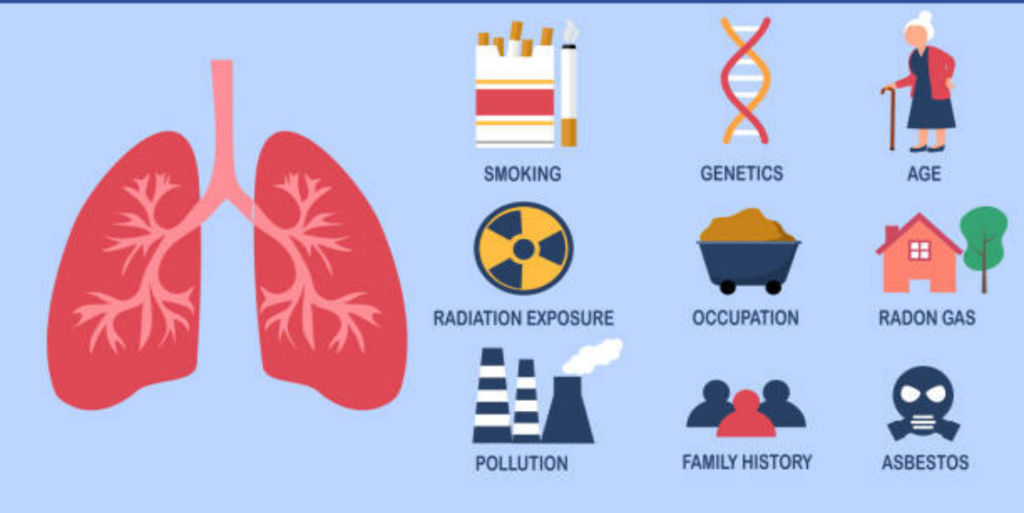- Have any questions?
- 085913 90567
- drgeorgechestdiseases@gmail.com
Lung Cancer Vs Bronchitis: Understanding the Key Differences

Is Throat Cancer the Same as Esophagus Cancer?
January 6, 2025
What to Do If You Are Anxious About Lung Cancer
January 11, 2025Lung cancer and bronchitis both affect the respiratory system, but they are distinct conditions with unique symptoms and treatment approaches. Lung cancer develops from abnormal cell growth in the lungs, whereas bronchitis is an inflammation of the bronchial tubes that carry air to the lungs.
Dr. George Karimundackal, a highly regarded surgical oncologist in Mumbai, notes, “While bronchitis is primarily caused by infection, lung cancer is a complex disease that often requires advanced intervention and personalized care.”
With over 15 years of experience, Dr. George Karimundackal has been instrumental in treating complex cases of lung cancer. He is recognized for his patient-centred approach and expertise in advanced, minimally invasive surgical techniques.
What makes these conditions so different? First, let’s take a closer look at lung cancer.
What is Lung Cancer?

Lung cancer is a type of cancer that originates in the cells of the lungs, usually in the lining of the bronchi or smaller passages. It occurs when normal cells mutate and grow uncontrollably, forming a tumor. This growth can interfere with lung function and may spread to other body parts, a process known as metastasis. Lung cancer is one of the most common and severe forms of cancer. It carries a high risk of becoming life-threatening if not detected and treated in its early stages.
- Lung Cancer Causes
The leading cause of lung cancer is smoking. However, non-smokers can also develop the disease. Other risk factors include exposure to secondhand smoke, radon gas, and environmental toxins. Additionally, genetic factors may increase the risk of lung cancer.
- Lung Cancer Symptoms
Common signs and symptoms of lung cancer include a persistent cough, chest pain, and shortness of breath. In advanced stages, patients may experience unexplained weight loss, fatigue, and coughing up blood.
- Risk Factors for Lung Cancer

Risk factors include a history of smoking, prolonged exposure to polluted air, genetic predisposition, and advancing age. Individuals over 65 are at higher risk, with men generally experiencing higher incidences than women.
Are you experiencing persistent cough or chest discomfort? Consult a specialist to identify the underlying issue. Book an appointment now!
Wondering how lung cancer compares with bronchitis? Let’s explore bronchitis next.
Understanding Bronchitis

Bronchitis is a respiratory condition that causes inflammation in the bronchial tubes, which transport air to and from the lungs. This inflammation leads to increased mucus production and respiratory discomfort, often making breathing difficult.
There are two primary types of bronchitis: acute and chronic. Acute bronchitis is commonly caused by infections and is a temporary condition that lasts a few weeks. In contrast, chronic bronchitis is persistent and is often associated with smoking, chronic obstructive pulmonary disease (COPD), and long-term exposure to irritants.
- Bronchitis Symptoms
Bronchitis symptoms typically include a persistent cough, mucus production, and a sore throat. Other symptoms may include wheezing, shortness of breath, and fatigue.
- Bronchitis Causes
Bronchitis is usually caused by viral infections, similar to those that lead to colds and flu. Smoking and long-term exposure to environmental pollutants are also significant contributors.
Could your symptoms indicate a severe health condition? Let’s compare lung cancer and bronchitis side-by-side.
Lung Cancer Vs. Bronchitis


Lung cancer and bronchitis are distinct respiratory conditions that differ in origin, symptoms, and severity. Lung cancer begins in the lung cells and can spread to other areas. It often goes undetected until advanced stages, making early diagnosis crucial.
Bronchitis, on the other hand, is inflammation of the bronchial tubes. While bronchitis is typically not life-threatening, chronic cases require proper management to prevent complications. Understanding these differences is essential for appropriate treatment.
Are you concerned about lung health? Reach out to an experienced professional for tailored guidance and care. Schedule a consultation today!
Want to know how these lung conditions are diagnosed and treated? Let’s dive in.
Diagnosis and Treatment

- Lung Cancer Diagnosis:
- Imaging Tests: Chest X-rays and CT scans are used to detect lung tumours.
- Bronchoscopy: A thin tube with a camera is inserted into the lungs to examine and take tissue samples.

- Biopsy: A sample of lung tissue is taken to confirm the presence of cancer cells.
- Sputum Cytology: Examining sputum under a microscope may help detect cancerous cells.
- Blood Tests: While not diagnostic for lung cancer, blood tests can help assess overall health and organ function.
- Lung Cancer Treatment:
- Surgery: If the cancer is localized, surgical removal of the tumor or part of the lung may be recommended.

- Chemotherapy: Drugs used to kill cancer cells or shrink tumors, often used in combination with surgery or radiation.
- Radiation Therapy: High-energy rays are employed to target and eradicate cancer cells or shrink tumors.
- Targeted Therapy: Includes drugs specifically targeting mechanisms in cancer cells, often utilized for non-small cell lung cancer.
- Immunotherapy: Boosts the body’s immune system to fight cancer more effectively.
- Bronchitis Diagnosis:
- Physical Examination: The doctor listens to the lungs for abnormal sounds like wheezing or crackles.
- Chest X-ray: Helps rule out other conditions and assess lung damage.

- Sputum Culture: A sample of mucus is tested to identify the presence of bacterial or viral infection.
- Pulmonary Function Tests: Measures lung function and airflow to assess the severity of bronchitis.
- Bronchitis Treatment:

- Antibiotics (for bacterial bronchitis): Used if a bacterial infection is present, although most cases are viral and do not require antibiotics.
- Cough Suppressants or Expectorants: Help manage symptoms like coughing and mucus production.
- Bronchodilators: Medications that help open the airways for easier breathing.
- Steroids: Used for chronic bronchitis to reduce inflammation in the lungs.
- Oxygen Therapy: In severe cases of chronic bronchitis, oxygen may be required to assist breathing.
“Effective diagnosis and treatment are essential in managing both lung cancer and bronchitis. Early detection and appropriate care can improve outcomes for both conditions,” states Dr. George Karimundackal, an acclaimed lung cancer specialist in Mumbai.
How can you reduce your risk? Here’s what you need to know about prevention.
Prevention Tips for Lung Cancer and Bronchitis

- Preventing Lung Cancer:
- Avoid Smoking: Quitting or avoiding smoking is the top method to prevent lung cancer.
- Limit Carcinogen Exposure: Minimize contact with harmful substances like asbestos, radon, and pollution.
- Regular Screenings: High-risk individuals, such as long-term smokers, should consider low-dose CT scans for early detection.
- Healthy Diet: A diet high in fruits and vegetables provides antioxidants that may reduce cancer risk.
- Exercise: Staying active boosts overall health and may lower cancer risk.
- Workplace Safety: Use protective gear in environments with harmful substances like chemicals and dust.
- Preventing Bronchitis:
- Quit Smoking: Smoking is the leading cause of chronic bronchitis. Stop smoking and avoid secondhand smoke to prevent bronchitis.
- Avoid Infections: Wash hands often and stay away from ill individuals to reduce infection risk.
- Get Vaccinated: Flu and pneumonia vaccines help lower the chances of infections leading to bronchitis.
- Improve Air Quality: Avoid polluted air and chemicals. Use air purifiers, especially in high-pollution areas.
- Boost Immunity: A balanced diet, exercise, and enough sleep strengthen the immune system, reducing respiratory infections.
- Wear Masks: Use masks to protect the lungs in polluted or chemical-laden environments.
Conclusion
Understanding the differences between lung cancer and bronchitis can help individuals make informed choices about their health. Consulting with professionals like Dr. George Karimundackal ensures accurate diagnosis and effective management of each condition.
Want to discuss your symptoms with a seasoned specialist? Seek expert guidance and care to take control of your lung health. Book an appointment now!
Frequently Asked Questions:
1. Which are the 4 symptoms of lung cancer that you should be aware of?
Persistent cough, chest pain, shortness of breath, and unexplained weight loss are common signs of lung cancer.
2. What are the symptoms of lung cancer in females?
The symptoms of lung cancer in females are generally similar to those in males but may sometimes be subtler or develop later. Key symptoms include coughing blood, unexplained fatigue, persistent chest pain, and difficulty breathing.
3. Can bronchitis turn into lung cancer?
Bronchitis itself does not directly cause lung cancer. However, chronic bronchitis, especially when caused by smoking, can increase the risk of developing lung cancer over time.
4. Is bronchitis contagious?
Acute bronchitis caused by viruses is contagious. However, chronic bronchitis, usually caused by long-term exposure to irritants, is non-contagious.
5. How long does acute bronchitis last?
Acute bronchitis typically lasts 2-3 weeks, though a cough may persist for a few weeks longer.
Disclaimer: This page is for informational purposes and not for promotional use.

